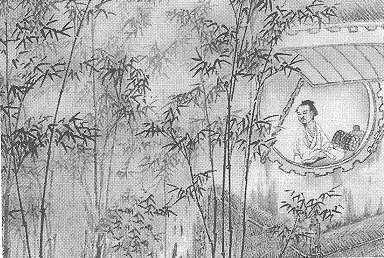|
陶淵明的意思是,像漢書上所寫的楊王孫那樣裸葬也沒有什麼不好啊,何必一定要像大家那樣花很多錢給死人穿衣服呢?可是你們要注意,陶淵明是主張一定要裸葬嗎?不是的,他最後又說:「人當解意表。」這是陶淵明很妙的一點。「意表」,用的是莊子的意思。《莊子‧天道》說:「語之所貴者意也,意有所隨;意之所隨者,不可以言傳也。」《莊子‧外物》說:「荃者所以在魚,得魚而忘荃;蹄者所以在兔,得兔而忘蹄;言者所以在意,得意而忘言。」就是說,只要你明白我的意思了,你完全可以忘記我用來表達這個意思的話,因為那是不重要的。「裸葬」不過是一種說法,你不要黏滯在這種說法上。比如念佛經,老師告訴你不要執著於佛經上的文字,要「即心即佛」,你自己的心就是佛。那好,你就記住這個「即心即佛」了。可是老師又說「非心非佛。」你到哪裡去掌握?子貢問孔子:「子如不言,則小子何敘焉?」老師不說,我們傳述什麼呢?孔子回答:「天何言哉,四時行焉,萬物生焉,天何言哉?」(《論語‧陽貨》)所以,不要執著。尤其是對名和利,更不要執著。你所要修的就是你內心的智慧、平安和快樂,是「稱心固為好」。這個「稱心」不是指名譽和物質利益上的滿足,而是指從名和利之中解放出來,使你的心得到真正的自由,滿足內心的理想和意志,這樣就好了。

陶淵明詩講 第十五講
在第十一首飲酒詩中,陶淵明提到了兩位古人顏生和榮公。在今天我們要講的第十二首飲酒詩中,他又提到了兩位古人,長公和仲理。現在我把這首詩讀一遍:
長公曾一仕,壯節忽失時;
杜門不復出,終身與世辭。
仲理歸大澤,高風始在茲;
一往便當已,何為復狐疑?
去去當奚道,世俗久相欺;
擺落悠悠談,請從余所之。
漢朝的張釋之是一個很有名的人,官做得很高。他的長子張摯,字長公,《史記‧張釋之傳》中說長公「官至大夫,免。以不能取容當世,故終身不仕。」做官的家庭,子弟往往也走仕途,但張摯做官做到大夫就辭職不幹了,因為他不能夠被當時的官場所接受。所以說:「長公曾一仕,壯節忽失時。」「壯節」,是壯年時節;「失時」,就是與當世不合的意思。長公年歲並不老,但是他覺得自己與當時的時代不合,所以就再也不出來做官了。我常常說,詩歌裡邊一定要有作者真正的感發在。陶詩裡常常說到古人,但幾乎每一個古人身上都有他自己的影子,他總是把自己對生命和生活的體驗藉古人的故事表現出來。
待續
|
|
Tao Yuanming reasoned that there was nothing wrong with Yang Wangsun’s naked burial, which was recorded in the
Book of Han History. Was it really necessary to follow conventions and spend a lot of money on funerary paraphernalia for a dead person? But then take note: Did Tao Yuanming really advocate the practice of naked burials? No, he did not, for the last line says: “People should understand the logic of such a practice.” This is a wonderful aspect of Tao Yuanming. The term ‘yi biao’ [‘expression of meaning’, here translated ‘logic’] is derived from Zhuangzi: “The value of words lies in their meaning, which can be inferred from the lines. The inferences, as such, are beyond the scope of words.” [Zhuangzi – The Natural Course of Events] There is another passage that says, “A fish-trap is used to catch fish, but once the fish is caught, the fish-trap is forgotten. A rabbit-snare is used to catch a rabbit, but once the rabbit is caught, the rabbit-snare is forgotten. Similarly, words are used to express thoughts, but once the thoughts are expressed, the words are forgotten.” [Zhuangzi – External Things] This is to say that once you understand my meaning, you may completely forget the words that I used because they are no longer important. The term ‘naked burial’ is only a figure of speech. You should not take it at face value. Zigong once asked Confucius, “If the Master did not speak, what should we disciples do?” This means if the teacher does not talk, what are we going to follow? Confucius replied, “Has Heaven spoken anything? Yet the four seasons run their course and the myriad things flourish and decline. Has Heaven said anything at all?” [Analects – Yang Huo] Therefore, do not be attached, especially to fame and wealth. What you need to cultivate is your inner wisdom, peace and happiness, which means to be ‘happy and content with your lot’. Contentment does not refer to the satisfaction derived from fame and material gains, but to being unaffected by fame and wealth, so that your mind can achieve true liberation. If you could realize your ideals and aspirations, then that would be good indeed.
Lectures on Tao Yuanming’s Poems (Lecture Fifteen)
In the eleventh ‘Drinking’ poem, Tao Yuanming talked about two ancient characters: Master Yan and Elder Rong. In today’s lecture on the twelfth ‘Drinking’ poem, two other ancients, Chang Gong and Zhong Li, are mentioned. Now, I am going to read this poem over once.
Chang Gong once served as an official;
In his prime, he found himself at odds with the times.
He secluded himself at home, never venturing out again,
And kept aloof from the world’s affairs to the end of his days.
Zhong Li returned to the Great Marsh,
Where he was revered for his lofty character.
Once you have left, don’t turn back,
For what is there to doubt further?
Make a clean break – why say anything more?
This mundane world is full of deceit.
Disregarding all the frivolous talk,
I prefer to follow my heart’s dictates.
During the Han Dynasty, there was an eminent person by the name of Zhang Shizhi who held a very high official position. His eldest son was called Zhang Zhi, styled Chang Gong. It was recorded that
“Chang Gong reached the rank of Great Officer before resigning. As he was unable to adapt to the times, he did not become an official again for the rest of his life.” [Records of the Grand Historian – The Biography of Zhang Shizhi] The offspring of an official’s family mostly become officials as well. However, when Zhang Zhi reached the position of Great Officer, he resigned and called it quits because he could not get along with others in the official circuit. Hence, it is said,
“Chang Gong once served as an official; in his prime, he found himself at odds with the times.” The term ‘zhuang jie’ means one who is in his prime, and ‘shi shi’ means that one cannot get along with the times. Chang Gong was still young but he was unable to adapt to the times and hence, he never became an official again. I have often stressed that a poem must be imbued with the poet’s true feelings. Tao often quoted the ancients in his poems but almost every ancient character was a reflection of himself. He always revealed his own experiences by means of comparison with those of the ancients.
To be continued

|